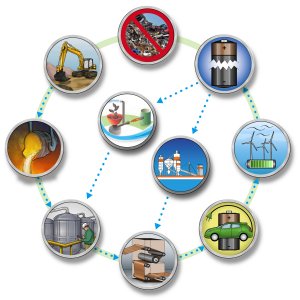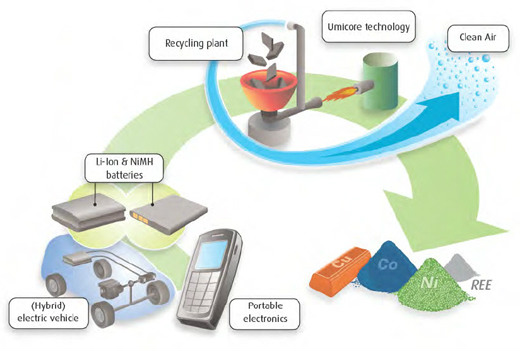 Metals are recycled because they are valued and because most of them share the inherent quality of recyclability. This is especially true of non-ferrous metals, a group that includes nickel. Nickel is amongst the most valuable of the common non-ferrous metals and the world's most highly recycled substance. In contrast to the rapid development within the nickel industry, growing consumption of nickel, and proliferation of waste materials, the level of nickel resources is declining.
Metals are recycled because they are valued and because most of them share the inherent quality of recyclability. This is especially true of non-ferrous metals, a group that includes nickel. Nickel is amongst the most valuable of the common non-ferrous metals and the world's most highly recycled substance. In contrast to the rapid development within the nickel industry, growing consumption of nickel, and proliferation of waste materials, the level of nickel resources is declining. - Industry experts estimate that nickel bearing scrap totaling 4.4-4.6 million tonnes per year is collected and recycled. This scrap is estimated to contain almost 350,000t of nickel (or one-quarter of the total demand) annually which is mainly used by the stainless steel industry. The nickel scrap processing industry consists of four or five major companies operating on an international level to ensure that nickel bearing scrap is collected from every corner of the globe. Moreover, batteries contain a variety of materials that can be reused as a secondary raw material. There are well-established methods and techniques for the recycling of most batteries containing lead, nickel-cadmium, nickel hydride and mercury. For some, such as newer nickel-hydride and lithium systems, recycling methods are still in the early stages. With huge opportunity for development, it follows that nickel collecting and recycling will become of great importance for the nickel industry.

- Source: http://www.batteryrecycling.umicore.com/UBR/
-
About us
Contact us
Make a suggestion
- Metalpedia is a non-profit website, aiming to broaden metal knowledge and provide extensive reference database to users. It provides users reliable information and knowledge to the greatest extent. If there is any copyright violation, please notify us through our contact details to delete such infringement content promptly.
 Metals are recycled because they are valued and because most of them share the inherent quality of recyclability. This is especially true of non-ferrous metals, a group that includes nickel. Nickel is amongst the most valuable of the common non-ferrous metals and the world's most highly recycled substance. In contrast to the rapid development within the nickel industry, growing consumption of nickel, and proliferation of waste materials, the level of nickel resources is declining.
Metals are recycled because they are valued and because most of them share the inherent quality of recyclability. This is especially true of non-ferrous metals, a group that includes nickel. Nickel is amongst the most valuable of the common non-ferrous metals and the world's most highly recycled substance. In contrast to the rapid development within the nickel industry, growing consumption of nickel, and proliferation of waste materials, the level of nickel resources is declining. 
